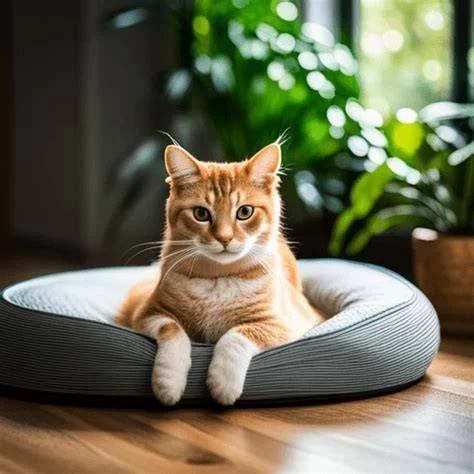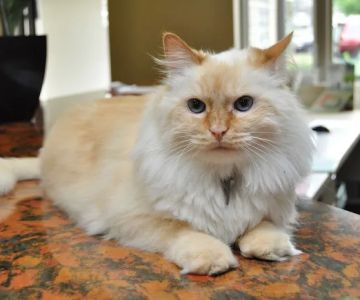Best Remedies for Cat Anxiety Due to Changes in Routine
Cats are creatures of habit, and any disruption to their routine can cause anxiety and stress. Whether it's a new family member, a change in your work schedule, or moving to a new home, these changes can lead to behavioral issues and health concerns in your feline friend. Understanding the causes of cat anxiety and knowing how to manage it is key to maintaining your pet’s well-being. In this article, we’ll explore some of the best remedies for cat anxiety and how to help your cat feel more comfortable during times of change.
1. Understanding Cat Anxiety and Its Causes
Before diving into solutions, it’s important to understand what causes anxiety in cats. While humans may not always recognize the signs of anxiety in pets, cats can display physical and behavioral symptoms when they feel stressed. Major changes in routine or environment are common triggers for anxiety in cats.

286 Wilmington West Chester Pike, Chadds Ford, PA 19317, USA
See Details1.1 Common Causes of Cat Anxiety
Cats may experience anxiety due to a variety of factors, including:
- Changes in the home environment, such as moving to a new house
- Changes in your schedule, like working longer hours or traveling more frequently
- The introduction of a new pet or family member
- Separation anxiety when you leave your cat alone for extended periods
- Loud noises, such as construction, fireworks, or thunderstorms
Identifying the source of your cat’s anxiety is the first step in addressing the issue effectively. Once you understand the cause, you can begin implementing strategies to help reduce your cat’s stress.
2. Best Remedies for Managing Cat Anxiety
There are several effective remedies for managing anxiety in cats. From behavioral modifications to natural calming products, here are some of the most popular and successful treatments for reducing stress in cats:
2.1 Maintain Consistent Routines
Cats thrive on routine, so maintaining a consistent schedule can help alleviate their anxiety. Try to feed your cat at the same time each day, keep playtime and walks on a regular schedule, and provide a quiet space for them to retreat to when needed. If you’re changing your schedule, gradually adjust your cat’s routine to avoid overwhelming them.
2.2 Create a Safe Space for Your Cat
When anxiety arises, it’s important to provide your cat with a safe and quiet space where they can retreat to feel secure. This could be a favorite spot in the house, a cozy bed, or even a designated room that is free of loud noises or disruptions. Cats often seek out these safe spaces when they are stressed, so giving them access to one can help reduce their anxiety.
2.3 Use Calming Products
Calming products, such as pheromone diffusers and calming collars, are designed to help reduce anxiety in cats. Products like Feliway mimic the natural pheromones that cats release to mark their territory, which can help create a sense of familiarity and comfort. Calming sprays, treats, and collars can also help ease anxiety, making them effective tools for managing stress during routine changes.
2.4 Provide Interactive Toys and Enrichment
Engaging your cat in play can be a great way to reduce anxiety and distract them from stressors. Interactive toys, such as puzzle feeders, treat-dispensing toys, and laser pointers, can help redirect their focus and provide mental stimulation. Playtime also provides an outlet for your cat’s energy, which can help reduce restlessness and improve their mood.
2.5 Offer Natural Calming Remedies
For a more holistic approach, consider using natural calming remedies such as catnip, valerian root, or CBD products formulated for cats. Catnip is well-known for its calming effects on many cats, while valerian root and CBD oil can promote relaxation and reduce anxiety. Always check with your veterinarian before introducing new natural remedies to ensure they’re safe for your cat.
3. Behavioral Training for Reducing Cat Anxiety
Behavioral training can also be an effective method for reducing anxiety in cats, particularly if the anxiety is linked to separation or fear of new situations. Positive reinforcement techniques can help your cat feel more comfortable and confident in stressful situations.
3.1 Gradual Desensitization
Gradual desensitization is a technique that involves slowly exposing your cat to the source of their anxiety in a controlled way. For example, if your cat is anxious about being left alone, you can start by leaving them for short periods of time and gradually increasing the duration. This helps your cat build confidence and associate your departure with a positive experience.
3.2 Positive Reinforcement
Using positive reinforcement, such as treats or praise, when your cat behaves calmly can help strengthen good behavior and reduce anxiety. For example, if your cat remains calm when introduced to a new family member or pet, reward them with a treat or extra playtime. Over time, this will encourage your cat to associate these situations with positive outcomes.
4. When to Consult a Veterinarian
While many cases of cat anxiety can be managed with the remedies mentioned above, it’s important to seek professional help if your cat’s anxiety persists or worsens. A veterinarian or animal behaviorist can provide additional support and may recommend medication or behavioral therapy for more severe cases of anxiety.
4.1 Medications for Severe Anxiety
In some cases, your veterinarian may prescribe anti-anxiety medications to help manage your cat’s symptoms. These medications are typically used in conjunction with behavior therapy and other anxiety-reducing strategies. Your veterinarian will assess your cat’s condition and determine if medication is necessary for their well-being.
4.2 Behavior Therapy with a Specialist
If your cat’s anxiety is severe or has been ongoing for a long time, working with a certified animal behaviorist may be beneficial. These specialists can help identify the root cause of your cat’s anxiety and provide a tailored treatment plan to help them adjust more effectively to changes in routine or environment.
At Hidden Brook Veterinary, we understand how challenging it can be to manage your cat’s anxiety. Our team is dedicated to helping you find the best solutions for your pet’s stress and anxiety, from behavioral support to calming products and professional advice. Visit our website to learn more about our services and how we can help your cat live a happier, stress-free life.











